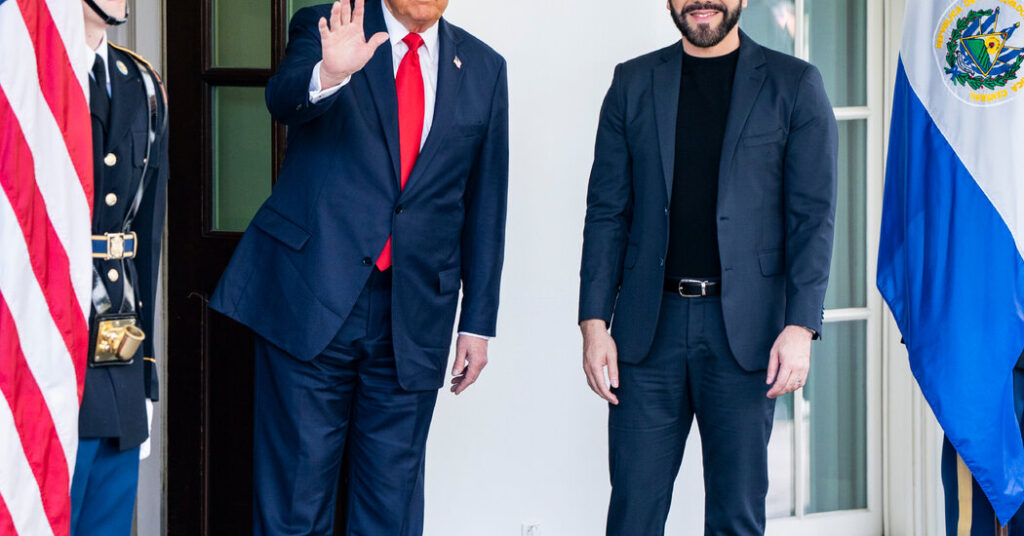El Salvador refused to return a U.S. deportee
At a White House meeting with President Trump, El Salvador’s president, Nayib Bukele, said yesterday that he would not return a man who was wrongly deported from the U.S. and sent to a notorious prison in El Salvador.
“Of course I’m not going to do it,” Bukele said when reporters asked if he was willing to help return the man, Kilmar Armando Abrego Garcia. The deportation case is at the heart of a legal battle that has gone to the Supreme Court. Here’s what else to know.
Bukele said that returning Abrego Garcia would be like smuggling “a terrorist into the United States.” As the Salvadoran president spoke in the Oval Office, Trump smiled in approval.
Background: The Trump administration has said that the deportation was an “administrative error,” and has been ordered by the Supreme Court to “facilitate” Abrego Garcia’s return. But Trump has defied the order.
Quotable: “This meeting is one of the starkest examples of a foreign leader fawning over and placating Trump during a visit to the Oval Office,” said Zolan Kanno-Youngs, a White House reporter for The Times.
More on the trade war
Zuckerberg took the stand in landmark Meta antitrust trial
Mark Zuckerberg, the chief executive of Meta, took the witness stand yesterday on the first day of a landmark antitrust trial that could dismantle his company.
The U.S. government has accused Meta of illegally creating a monopoly by acquiring Instagram and WhatsApp when they were tiny start-ups. The trial poses the most consequential threat yet to Zuckerberg’s business empire.
In a packed courthouse in Washington, federal lawyers presented Zuckerberg with emails and internal communications about his acquisition strategy. In response to a 2012 email, in which he discussed keeping Instagram going without adding more features, Zuckerberg said he viewed that as “relatively early thinking.” He added that, in practice, “we ended up investing a ton” after acquiring the platform.
What’s next: Zuckerberg is expected to resume testimony today. During the eight-week trial, the government and Meta are expected to tell competing versions of Meta’s 20-year growth story. If the judge rules against Meta, Zuckerberg may be forced to sell Instagram and WhatsApp, potentially altering a long pattern in Silicon Valley of Big Tech companies snapping up younger rivals.
China’s leader courted Vietnam amid the trade war
President Xi Jinping of China arrived in Vietnam yesterday at the start of a tour of Southeast Asia. The Chinese leader will try to rally other nations to Beijing’s side, as U.S. tariffs threaten economic growth.
In an essay published just before his arrival, Xi called on other countries to join China in defending stability, free trade and “an open and cooperative international environment.”
While the Chinese leader will be welcomed during his tour, Vietnam and its neighbors are also trying to appease Trump to get tariffs lowered, which may make them resistant to making bold pro-China pronouncements.
MORE TOP NEWS
Jeff Bezos’ Blue Origin rocket launched the singer Katy Perry and five other women, including his fiancée, yesterday. Blue Origin pitched the space tourism flight as a way to encourage more women to pursue careers in science.
Amanda Hess, one of our critics at large, writes that the effort may have fallen short. “If the flight proves anything, it is that women are now free to enjoy capitalism’s most decadent spoils alongside the world’s wealthiest men,” she wrote.
Remembering Mario Vargas Llosa
The Peruvian author Mario Vargas Llosa, who died on Sunday at 89, was the last surviving member of the Boom movement of socially conscious Latin American writers that included Gabriel García Márquez and Carlos Fuentes, among others.
He was the world’s savviest and most accomplished political novelist, our book critic Dwight Garner writes. Vargas Llosa’s political novels are morally complex and meticulously observed, but life’s absurdity sneaks into them. Read Dwight’s appreciation here.
https://www.nytimes.com/2025/04/15/briefing/el-salvador-trump-deportation-meta-zuckerberg-xi-china-vietnam.html


